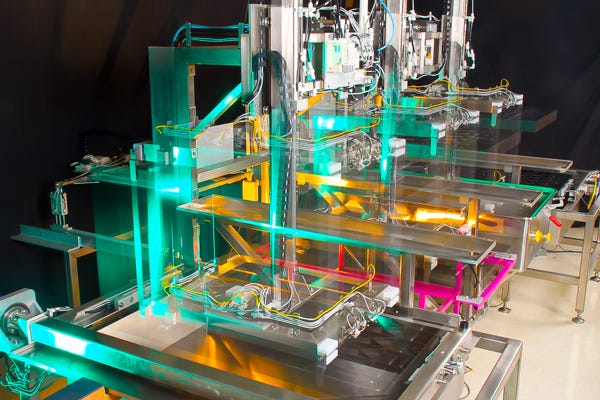August 5, 2016
Think higher quality products, completely compliant to regulations, for a fraction of the cost.
John Dzelme, Seabrook Technology Group

The concept of Industry 4.0 is quickly gathering weight across the manufacturing industry, as the reality of its onset becomes imminent. This new era, which follows on from the third industrial revolution of automation, will bring the "Internet of Things" and advanced technologies to the world of manufacturing, leading to unprecedented precision and efficiency within production. It will transform the way goods of all types including medical devices are produced across the globe.
Why Manufacturing Execution Systems Will Be So Important in Industry 4.0
|
John Dzelme |
Medical device manufacturers, because of the complex nature of their products and the complex regulations they abide by, will need MES (Manufacturing Execution Systems) technology more than ever to remain relevant in this new era of the "digital" or "smart factory." This is because a crucial aspect of the digitization of manufacturing requires the entire production process to operate as a cohesive whole. Individual Machines and their performance should no longer be seen as separate entities, but viewed as one overall system. MES is a mission critical tool in the development of a streamlined, cohesive manufacturing process, as it enables communication between other mission critical systems, such as Product Lifecycle Management (PLM) with the machines on the shop floor, in addition to being the master system interface with the operation itself.
Manufacturing complexity of this magnitude is not expected to become any more simplified with the progression of demand in the market for more complicated and personalized products that contain more options and features than ever before. The MES and Industry 4.0 concept will not only address the needs for managing this complexity, but it will also reduce the risk of production issues and product quality.
Further, the tight integration and holistic visibility into the process is also intended to ultimately minimize the cost of goods sold through the minimizing and/or elimination of manual work, rework, scrap, and disparate systems that cause inefficiencies throughout the processes.
What advances in MES make it so relevant for medical device manufacturers in the future?
It's crucial that medical device manufacturers are constantly ready to respond to the rapidly changing and ever increasing demands of regulation. MES has constantly evolved and adapted to these changes, to ensure regulatory compliance, with the added advantage of leading to savings in the overall cost of compliance. Not only will the use of MES in Industry 4.0 lead to products of increased sophistication and quality, but compliance with health industry regulations will be enforced, before the product even leaves the shop floor.
Further developments in MES technology are resulting in measurable benefits for the organizations that adopt them. Benefits include:
Elimination of paper-based manufacturing processes which is error-prone and allows for viable savings in paper, printing, and archiving;
Management of greater product complexity and output;
Driving equipment setup and recipe execution;
Full traceability and product genealogy.
What Is the Relationship Between MES and the Internet of Things?
The Industry 4.0 era will require even faster production of products of an even more superior quality. In order for medical device organizations to achieve this, robust communication between machines, services, and devices will be necessary to reach maximum effectiveness.
Although we hear a lot about the Internet of Things in the context of Industry 4.0, the objective of Industry 4.0 is not to move everything over to the realm of IT, but rather it is to embed network connected technology into all aspects of the process from design to shipping. This embedded technology would enable a new level of sophistication in production equipment and minimize the effort required to manage processes entirely.
The MES already acts as the central nervous system of the production floor and therefore will become the gateway to operational connectivity to the rest of the organization.
The Internet of Things (IoT) will be enabled by MES to ensure that operational data is passed from machine to machine, system to system, and from the assembly line to other departments in real-time. This communication of real-time data is not possible without the integration of IoT with MES systems in an organization, and this evolution will lead to unparalleled precision and efficiency in manufacturing. For example, it will allow for machines to adjust production speed themselves based on various process characteristics being monitored. It will also allow for the prediction of potential machinery failure so these can be repaired at a scheduled time, eliminating the need for emergency and unscheduled repair work.
The enablement of predictive manufacturing through this level of technological connectivity will open up a whole new level of production capabilities never achieved before. Lead times will be dramatically shorter, enabling manufacturers to respond and adapt to changes in customer demand in almost real-time. The ability to perform accurate simulation tests on product design changes without manufacturing a single part will significantly reduce the lead time for new product introduction and the costs associated.
What Kind of Things Could Industry Make Going Forward That It Isn't Able to Make As Well Now?
It is difficult to say as we can only dream of what future inventions might come once Industry 4.0 is embraced. However, if we look at the practical application of MES and what the integrated technology concept of Industry 4.0 can do, we can be absolutely certain that we will be able to manufacture much higher quality products, completely compliant to regulations, for a fraction of the cost.
The market is driving personalized medicines, personalized orthopedics, personalized disease cures, DNA repairing solutions, etc. The level of complexity and sophistication required with the production processes, and the required design process, causes so many manufacturing challenges and patient safety risk that these cutting-edge technologies are expensive and therefore only supplied in a very small segment of the respective markets. The challenges and costs constrain manufacturers from entering this market, and therefore limits the competition and innovation within. By providing an MES and Industry 4.0 ecosystem, that mitigates a lot of the risk and reduces the overall research and design and manufacturing costs, you enable more suppliers to enter the market, causing it to grow. This in turn fuels competition and innovation.
The people running the machines and the people in tech are two different types of experts. How can this challenge be overcome?
The increasing convergence of technology and operations over the past decade has already caused communication, support, and system design complexities within organizations today. Clearly the traditional IT organization is already being transformed through the wider adoption of MES. Where the traditional core IT organization used to be a disparate business unit working behind the scenes to support infrastructure and back office technology, it has now become embedded into the day-to-day operations. The manufacturing industry has coined a new technical group of IT personnel called "Manufacturing IT". Manufacturing IT are technical professionals that understand the business side of the world and even understand the unique demands of the manufacturing floor. This group of professionals are not focused on the infrastructure, but on the technologies and systems used within production. These individuals have a unique skill set the bridge the gap between technology and the end user.
There will also need to be a shift in manufacturing engineering skill sets. The older skill set of a tradesman will only serve as the foundation of skill sets needed for the Industry 4.0 engineer. A higher need for sophisticated computer logic will require equipment to become "smarter" than ever before. This will require a technology savvy engineer that can solve mechanical and software related problems.
Similarly, the skill set of a production technician will require a high amount of interaction and understanding of computer driven manufacturing. The amount of traditional manual labor will be significantly decreased, while while there will be a significant increase in demand for personnel who can perform data analysis and mining.
John Dzelme leads global operations for manufacturing software specialists Seabrook Technology Group (Cork, Ireland)--and is an internationally recognized expert in MES, lean manufacturing, and manufacturing intelligence strategies.
[Images courtesy of Seabrook Technology Group]
About the Author(s)
You May Also Like



